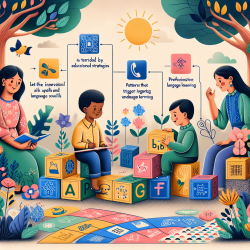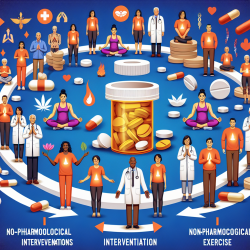In the ever-evolving field of speech and language therapy, practitioners are constantly seeking innovative methods to enhance their teaching strategies and improve student outcomes. The Pla-Act Language Remediation Program, as reviewed in the research article by Jacqueline Marlowe Rosenberg, presents an engaging approach to developing speech and language skills through play and performance. This blog aims to provide insights into how practitioners can leverage the findings from this research to refine their therapy sessions or inspire further exploration into playful learning methods.
The Pla-Act Program is designed around the use of scripts based on fables, stories, and fairy tales, which are performed by children over a series of sessions. This approach not only aids in the development of vocabulary, figurative language, morphology, syntax, memory, and listening skills but also promotes turn-taking, organizational skills, and teamwork. Perhaps most importantly, it offers children positive feedback from speaking situations, leading to increased self-esteem and self-confidence.
Here are several ways practitioners can implement or be inspired by the outcomes of the Pla-Act Program:
- Integrate Play into Therapy: Use scripted plays and performances as a supplement to traditional therapy sessions. This can make learning more enjoyable and relatable for children, encouraging participation and engagement.
- Focus on Teamwork and Collaboration: Encourage children to work together in groups to perform the scripts. This not only improves language skills but also social interaction and cooperation.
- Customize Materials: While the Pla-Act scripts may not target specific language or speech structures you are working on, they can be adapted or serve as inspiration for creating your own scripts that meet the individual needs of your students.
- Measure Progress: Utilize the prepost test included in the Pla-Act instruction manual to assess the effectiveness of the program in improving language skills over time.
- Encourage Performance: Organize performances for an audience, which can be a powerful motivator for children and a rewarding way to showcase their progress.
While the Pla-Act Program has its limitations, such as the potential mismatch between the scripts and specific therapeutic targets, it offers a valuable general language stimulation tool. It highlights the importance of making therapy sessions enjoyable and engaging for children, which can significantly impact their motivation and progress.
For practitioners interested in exploring this approach further or seeking to incorporate playful learning into their therapy sessions, the Pla-Act Program provides a solid foundation. By adapting the principles outlined in the program, therapists can create a more dynamic and effective learning environment that fosters not only language development but also confidence and teamwork among their students.
To read the original research paper, please follow this link: Pla-act. A Language Remediation Program.










